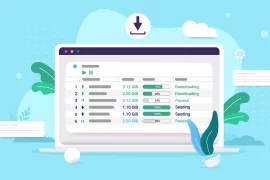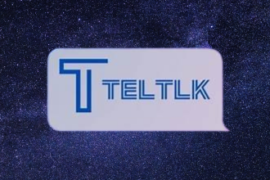Downloading downpours to the cloud rather than your nearby PC has turned into an undeniably famous choice as of late.
There are a few advantages to cloud torrenting, for example, not occupying extra space on your gadgets, having the option to get to your records from any place, and added security and secrecy.
Nonetheless, there are additionally a few disadvantages to consider. This article will make sense of how cloud torrenting functions, the upsides and downsides, and ways to download downpours securely to the cloud.
Can You Download It Directly To The Cloud?
You can download torrents directly to cloud storage rather than a local hard drive, thus the answer is yes. Several techniques can be used to do this:
- Use a cloud torrent client like Offcloud or Bitport.io. These services allow you to paste in a torrent link or magnet link and have the file downloaded directly to your cloud storage provider of choice, like Google Drive, Dropbox, or OneDrive.
- Manually move downloaded files from your computer to cloud storage after the torrent completes. This takes a few extra steps but works with any regular torrent client.
- Use a remote torrent client like Seedr that downloads to remote servers. You can then access and stream the files from their servers or transfer them to connected cloud storage.
- Mount cloud storage like Google Drive as a virtual drive on your computer using something like Rclone. Your regular torrent client will save files directly to cloud storage instead of local drives.
So in short, yes cloud torrenting is possible, you just need the right tools and setup. The easiest methods are using a dedicated cloud torrenting service or a remote torrent client.
What Is The Cloud Server For Torrents?
There are a few popular cloud servers and services used for torrenting:
- Seedr: This is a dedicated cloud torrenting service. You paste in torrent links, Seedr downloads the files on their remote servers, and then you can stream or download the files.
- Offcloud: Another dedicated service for cloud torrenting. You add torrents through their interface and select a connected cloud drive for storage.
- Bitport: Similar to Offcloud, this service lets you paste torrent links and downloads directly to the cloud. Supports many cloud drives.
- Google Drive: One of the most widely used cloud storage options. You can manually move torrents here or use a cloud torrent client to download directly.
- OneDrive: Microsoft’s cloud storage solution. It can also be used for cloud torrenting through various apps and tools.
- Dropbox: Another very popular cloud storage provider. Some cloud torrent services support downloading directly here.
The key when choosing a cloud storage provider is ensuring they allow you to download torrents and don’t have strict copyright policies that could result in account termination. Google Drive, OneDrive, and Discord in China can work, but be careful of overuse.
Is Cloud Torrenting Safe?
Cloud torrenting is generally safer than torrenting directly to your local computer. But there are still some dangers to think about:
- Account termination: Many cloud storage providers prohibit copyright infringement and may terminate your account if they detect excessive torrent downloads.
- Visibility to ISP: Your ISP can still see you are torrenting even if files go to the cloud. Using a VPN for some tv hides this activity.
- Malware: Downloading torrents from untrusted sources carries a malware risk, even if saved in the cloud.
- Privacy: Your cloud storage provider has access to your files and downloads. Encrypting sensitive files is recommended.
- Speed throttling: Cloud drives may throttle speeds for large uploads/downloads, which can slow torrent transfers.
So while cloud torrenting adds a layer of protection, it is not completely foolproof. Following best practices like using trusted torrent sources, a VPN for Ometv, and encrypted storage will keep your identity and data secure.
Is Torrenting Safer With A VPN?
Yes, using a VPN when torrenting makes the activity much safer by encrypting and anonymizing your connection. There are a few major benefits to using a VPN for torrenting:
- Hides your IP address so torrent peers only see the VPN server’s IP, not your personal one. This provides anonymity.
- Encrypts all torrent traffic between you and peers. ISPs and outsiders cannot see what you are downloading.
- Allows you to torrent safely on public Wi-Fi networks without worrying about snooping.
- Avoids anti-piracy notices from copyright holders which are usually targeted at specific IPs.
- Bypasses any torrent throttling, blocking, or banning by your ISP when connected to a VPN.
- Lets you access torrent sites and content that may be geo-blocked in your region.
Some VPNs even have port forwarding specifically for torrent traffic. Overall, a VPN provides essential protection and privacy for safe torrenting. Even when using cloud torrenting, a VPN adds an important additional security layer.
Is The Cloud 100% Safe?
No, cloud storage is not inherently 100% safe or impervious to hacking and leaks. Some risks include:
- Data breaches: Cloud services can be hacked just like any online platform, exposing files. Enable 2FA and strong passwords.
- Malware: Cloud files can still contain malware if originally downloaded from an infected source.
- Server outages: Service disruptions or crashes can temporarily block cloud access. Maintain local backups of critical files.
- Account termination: Cloud providers can delete your account if their Terms of Service are violated, like for copyright infringement.
- Government requests: Cloud companies may hand over user files and data if government agencies legally request them.
- Insider threats: Cloud provider employees may abuse their access to view or obtain user files.
- Device syncing: Cloud folders synced to your computer are still accessible if the device is compromised.
While the cloud offers distinct advantages, your data is inherently still with a third party. Take measures to encrypt sensitive files locally before uploading them for maximum security.
What’s Torrent-To-Cloud Downloading?
Torrent-to-cloud is a method to directly save torrent files in online storage services like Google Drive or Dropbox, eliminating the need for a local download. It’s convenient and can help manage large files efficiently.
How Does Cloud Work?
Torrent-to-cloud services fetch and transfer torrent data to cloud storage, bypassing the need for a personal download. Seedboxes or dedicated platforms facilitate this process for efficient and secure downloading.
Conclusion
In summary, the cloud offers notable benefits for security and convenience but also has risks. Use best practices like enabling backups, 2FA, VPNs, and encryption to better protect your cloud data and torrent downloads.



